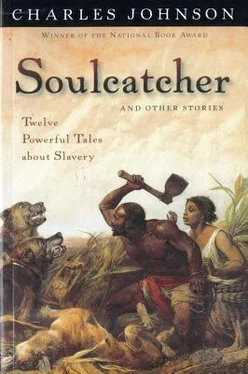"I know so."
"Thank you, ma'am. You are most kind."
"Will you continue, then, with this bristling, new poem?"
"Perhaps, if I can find my way into it. The problem is not that I don't feel outrage whenever I read or see or hear of injustice, it's rather that I fear I have no real talent for that sort of writing and rhetoric. For things I hate. I think I can compose passably well a hymn to morning, but as soon as I turn my pen to painting a portrait of a slave suffering beneath the lash, I cut myself off from what flows most easily from me — the things I love — and the words fall woodenly, unconvincingly, onto the page."
"No, it's not your best work."
"You're not supposed to say that!"
"Sorry! I was just agreeing with you, that's all. You needn't bite my head off!"
"You're supposed to tell me it's good."
"Fine, it's good."
"You don't mean that."
"You're right, I don't, but I'm in no mood for an argument before breakfast. And it's not why I wanted to talk to you."
"Why did you?"
"You know how yesterday I felt poorly and stayed in bed?"
"Yes?"
"Well, I didn't bother with the post. All the mail, scented and sealed with candle wax, sat on a wig stand until I awoke this morning. I began looking through it, and I found a letter addressed to you. Perhaps I shouldn't give it to you if you're planning now on starting a new life as a composer of pamphlets."
"Oh, please! Who is it from?"
"Phillis, I think you should sit down."
" Who? "
"May I read it to you?"
"I can read!"
"But I would enjoy it so!"
"All right, then! Read!"
"Ahem…
" Miss Phillis,
Your favor ofthe 26th of October did not reach my hands till the middle of December. Time enough, you will say, to have given an answer ere this. Granted But a variety of important occurances, continually interposing to distract the mind and withdraw the attention, I hope will apologize for the delay, and plead my excuse for the seeming but not real neglect. I thank you most sincerely for your polite notice of me, in the elegant lines you enclosed; and however undeserving I may be of such encomium and panegyric, the style and manner exhibit a striking proof of your poetical talents; in honor of which, and as a tribute justly due to you, I would have published the poem, had I not been apprehensive that, while I only meant to give the world this new instance of your genius, I might have incurred the imputation of vanity. This, and nothing else, determined me not to give it place in the public prints…. If you should ever come to Cambridge, or near headquarters, I shall be happy to see a person so favored by the Muses, and to whom nature has been so liberal and beneficent in her dispensations. I am, with great respect…
Your obedient, humble servant,
George Washington "
"He said… servant?"
"Here, see for yourself."
"This a complicated time, isn't it?"
"Yes, dear, I think it is."
YOU ALWAYS WERE a gambler.
Before the war broke out, when you were still a servant in Master William Selby's house, you'd bet on anything — how early spring thaw might come, or if your older brother Titus would beat your cousin Caesar in a wrestling match — and most of the time you won. There was something about gambling that you could not resist. There was suspense, the feeling that the future was not already written by white hands. Or finished. There was chance, the luck of the draw. In the roll of dice or a card game, there was always — what to call it? — an openness , a chance that the outcome would go this way or that. For or against you. Of course, in bondage to Master Selby there were no odds. Whichever way the dice fell or the cards came up, you began and ended your day a slave.
But did you win this time?
Standing by the wooden rail on a ship bound for Nova Scotia, crammed with strangers fleeing the collapse of their colonial world — women and children, whites and blacks, whose names appear in Brigadier General Samuel Birch's Book of Negroes— you pull a long-shanked pipe from your red-tinted coat, pack the bowl with tobacco, and strike a friction match against a nail in your bootheel. You know you are fortunate to be on board. Now that the Continental Army is victorious, blacks who fought for the crown are struggling desperately to leave on His Majesty's ships departing from New York harbor. Even as your boat eased away from the harbor, some leaped from the docks into the water, swimming toward the ship for this last chance to escape slavery. Seeing them, you'd thought, That might have been me. But it wasn't; you've always been lucky that way, at taking risks. Running away from bondage. Taking on new identities. Yet you wonder what to call yourself now. A loyalist? A traitor? A man without a country? As the harbor shrinks, growing fainter in the distance, severing you forever from this strange, newly formed nation called the United States, you haven't the slightest idea after years of war which of these names fits, or what the future holds, though on one matter you are clear:
From the start, you were fighting for no one but yourself.
The day after Lieutenant General Sir Henry Clinton promised liberty to all blacks deserting the rebel standard and willing to fight on the side of the British, you learned that Titus and Caesar were planning to flee. In the evening, on your way to the quarters after finishing your duties in the house, Titus stopped you outside the barn, and asked, "Can you go back to the kitchen and sneak out some provisions for us?" Naturally, you'd asked Kim what for, and he put his fingers to his lips, shushing you. They planned to steal two horses, he said. Then ride to safety behind British lines. "You're leaving?" You were almost speechless with anger. "And you're not taking me?"
"How can I?" he asked. "You're only fifteen."
"What's that got to do with anything? I can fight!"
"You ever fired a gun?"
"No, but I can learn!"
"Once I'm free, and got the papers to prove it, I'll come back."
"Titus, if you don't take me, I'll tell. "
For a heartbeat or two, Titus looked as if he might hit you. Grudgingly, he agreed to bring you along, despite your age and his declaration after your parents' deaths that he'd keep you from harm. You did as he requested, returning to the house and filling a sack with food, Master Selby's clothing, even some of the mistress's jewelry that the three of you might barter, then delivered all this to your brother and Caesar in the barn. The three of you left that night on two of the master's best horses, you riding behind Titus, your arms tightly circling his waist until you stopped to make camp in the woods. There, Caesar suggested that it would help if you all changed your names and appearances as much as possible since Master Selby was sure to post your descriptions. Titus said fine, he'd grow a beard and call himself John Free. Caesar liked that, said, "Then I'll be George Liberty." They waited for you to pick a name, poking sticks at the campfire, sending up sparks into the starless sky. "Give me time," you'd said, changing into buckskin breeches, blue stockings, and a checkered, woolen shirt "I'll shave my hair off, and I'll think of something before we get there. I don't want to rush." What you didn't tell them that night was how thrilling, how sweet this business of renaming oneself felt, and that you wanted to toy with a thousand possibilities — each name promising a new nature — turning them over on your tongue, and creating whole histories for each before settling, as you finally did, on "Alexander Freeman" as your new identity.
Читать дальше












